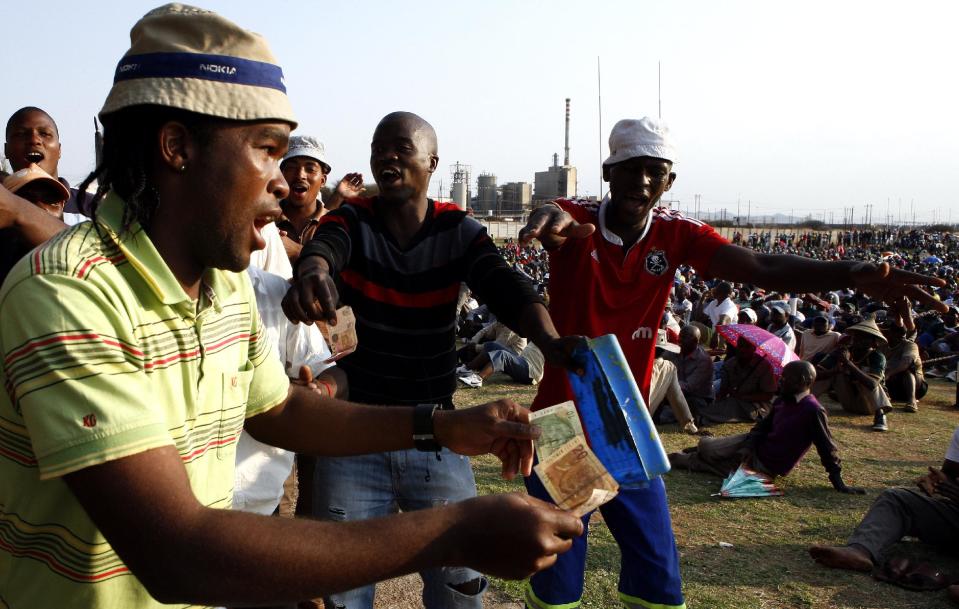South Africa: Striking miners accept Lonmin offer
MARIKANA, South Africa (AP) — Striking platinum miners in South Africa have accepted an offer for higher wages with London-registered Lonmin PLC to end a deadly and bitter nearly six-week strike, but Tuesday's agreement does not resolve the rage engendered by the country's huge inequality and government failure to address massive unemployment and poverty.
The strike had spread to gold and chrome mines, scaring foreign investors in Africa's largest economy and, according to President Jacob Zuma, costing the country at least $500 million.
Media coverage of miners living in tin shacks without electricity or running water has highlighted government failures to improve the lives of the majority of poor South Africans suffering high unemployment and poor education and health services.
The deal reached Tuesday for the world's third-largest platinum producer includes a 22 percent pay increase and a payment of 2,000 rand ($250) for miners who persisted with a no-work, no-pay stoppage, according to Anglican Bishop Joe Seoka, a member of the negotiating team and head of the South African Council of Churches. Strikers wanted to nearly double their monthly take-home pay to 12,500 rand ($1,560).
The trouble began Aug. 10 at Lonmin and ended up killing 45 people. On Aug. 16 police opened fire on demonstrating strikers, killing 34 of them and wounding 78 in the worst state violence since apartheid ended in 1994. It traumatized the nation of 48 million and raised questions about how much the poorest of the poor have benefited since white rule ended.
"Mission accomplished!" was the message inscribed in black ink on the hand of one striker in a crowd some 5,000 addressed by Bishop Seoka on Tuesday.
The violence was rooted in rivalry between the dominant Union of Mineworkers, which is allied with the governing African National Congress and is accused by workers of being too preoccupied by business and politics to take care of the basic shop-floor needs of its 300,000 members.
"You have won as workers!" Seoka told the crowd, who cheered, sang and danced. He said there will be further negotiations in October to discuss another wage increase.
Seoka was among mediators at government-sponsored negotiations that continued Tuesday night to finalize the deal.
The end of the strike — which has cost Lonmin more than 20 percent of its share value and forced it into negotiations with debtors wanting payments due at the end of September — has not resolved far bigger issues in South Africa.
The strike has highlighted the country's widening gap between the majority poor and a small black elite enriched, often corruptly, through shares in mines.
Despite promises by the ruling African National Congress to redress the concerns of its major constituents, South Africa has become the most unequal nation on Earth, and raised questions about Zuma's leadership just as he prepares for a crucial governing party congress in December that will decide whether he gets another term as leader of Africa's richest economy.
Government plans in the aftermath of the brutal apartheid regime to share the wealth of a country that provides 75 percent of the world's platinum, a fourth of its chrome and is in the top 10 of gold producers have made a small handful of blacks billionaires, joining a small white elite that continues to control an economy dominated by mineral resources and agriculture.
South Africans have become increasingly enraged by the disparity, which has weakened trade unions and a government alliance that includes the ruling party and its partners the Congress of South African Trade Unions and the South African Communist Party. The alliance was fractured over Zuma's continued leadership even before the strikes, which have jeopardized his future as South Africa's president.
On Monday, the head of the trade unions suggested that government failures could bring down the ruling party. COSATU President Sidumo Dlamini said that 30 million of South Africa's 48 million people survive on less than 10 rand ($1.25) a day.
"What we see happening (in Lonmin's mine) at Marikana and elsewhere is that workers are essentially demanding a living wage. Workers are simply saying we produce wealth and we want our reasonable share, and they expect to be given a fair share ... This is a reflection of the demands being harbored by millions of our people," he said.
The Lonmin workers were the first to strike, and in recent weeks seven other mines had work stoppages, including six platinum mines, a gold one and a chrome one.
Anglo American Platinum is the world's largest producer of the metal used in jewelry and to reduce carbon emissions of high-end vehicles. The company said it was using police protection Tuesday to resume operations at four of its mines in the Rustenburg area, where Lonmin also is located.
Anglo American Platinum had claimed its workers were not striking, but that it had shut down operations to ensure their safety against violent threats. But it did not say Tuesday how many workers had reported for duty.


